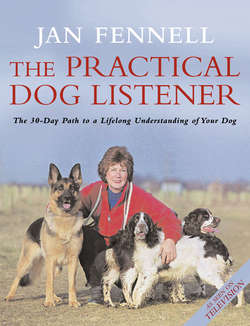Читать книгу The Practical Dog Listener: The 30-Day Path to a Lifelong Understanding of Your Dog - Jan Fennell - Страница 14
Buying a Puppy
ОглавлениеFalling in love with a puppy is the easiest thing in the world. We’ve all experienced the ‘aaah’ factor, that moment when we’ve stared for the first time into the saucer-sized eyes of a sweet, young dog and gone hopelessly gooey. It’s for this reason that I recommend you begin your search for a puppy by steering clear of these charmers to begin with. You know that you are going to fall head over heels in love with the puppy – it’s a given. Far better for you to deal with the realities before beginning the romance, and the best way to do this is by first meeting the family.
Producing a litter of puppies involves collaboration between the human breeder and their dogs. The dogs deliver this new life into the world, but it is the human who must shoulder the ultimate responsibility. I passionately believe that the best way to assess whether a dog is coming from a good home is by meeting both sets of ‘parents’, that is both the human and canine carers.
Given that many breeders go to a stud to begin their litters, it is more than likely that only the mother will be available. The condition of the owner and its home, its personality, temperament and general demeanour will reveal much. Of course, part of the equation is missing if the father is not there. Seeing both will provide the clearest idea possible of the sort of dog their offspring is going to become, nevertheless, a visit to the mother will always be worthwhile.
Just as importantly, the attitude and behaviour of the owner is highly revealing too. If, for instance, the mother is not with its puppies, there are immediate reasons for concern. The growth of puppy farms is one of the more unpleasant facts of life these days. The absence of the mother may mean that the seller is a third party, whose motives are purely to do with money rather than the welfare of the dogs in their protection.
Another good indicator of the quality of the home is the extent to which the seller interrogates all potential new owners. A potential buyer should expect to be grilled by a good breeder: I know, as I always insist on finding out as much as I can about anyone who wants to take one of my puppies into their home. The procedure should be like that of an adoption society being very careful about where it places the children entrusted to its care. Good breeders should be just as diligent in finding a home for the innocent young lives for which they are responsible.
A reputable breeder should want to know everything about the home into which they are considering releasing the puppy. They should want to know what the domestic situation is at home: are there people around all day to look after the dog? Are there many small children in the home? Has the prospective owner owned this type of dog, or indeed any dog, before? Another important question is whether the prospective owner has thought about whether a particular breed is right for their home. Also, are they willing to wait for a puppy? Good breeders do not churn out dogs as if from a production line. If the breeder asks these questions, it should be seen as a positive sign. If they do not, they are probably more interested in making a sale and should therefore be treated with caution.
By the same token, a good breeder should be open to questions from a potential owner. They should be willing to reveal anything and everything about the dog’s history and background, from the details of its parentage and its age, to its favourite food and toys. Again, owners should be wary of anyone who is vague or unhappy about answering these questions. I’ve never been afraid to talk to potential owners in this kind of detail. Indeed, I’ve made very good friends of people who have bought puppies from me.
Potential owners should be particularly careful about checking for hereditary problems within some breeds. Cavalier King Charles spaniels can be prone to heart problems, for instance; Dalmatians can suffer from deafness; long-backed breeds, like basset hounds and dachshunds, have a tendency to suffer from back pain and slipped discs. With German shepherds and Labradors, potential buyers should look out for hip dysplasia, a genetic problem in which the ball-and-socket joint of the hip can be deformed or even nonexistent. It is a condition that is extremely painful and ultimately crippling for dogs that are afflicted and something that good breeders monitor closely. Dogs are x-rayed at the age of one and given a ‘hip score’, which ranges from zero for perfect hips, to eighteen and higher, a mark that indicates the dog should not be used for breeding.
All good breeders work hard to eliminate these problems. But, so as to make informed and appropriate choices, potential owners are well advised to thoroughly research the breeds they are interested in. This is easily done through the Kennel Club or its equivalent organisation, and then through the various breed experts. The importance of this cannot be overstressed. No one goes out to make a major purchase like a new car or a house without checking out the subject thoroughly. When they choose a dog, owners are introducing into the family a new member that will hopefully remain with them for twelve to fourteen years; it is not something to be taken lightly.
